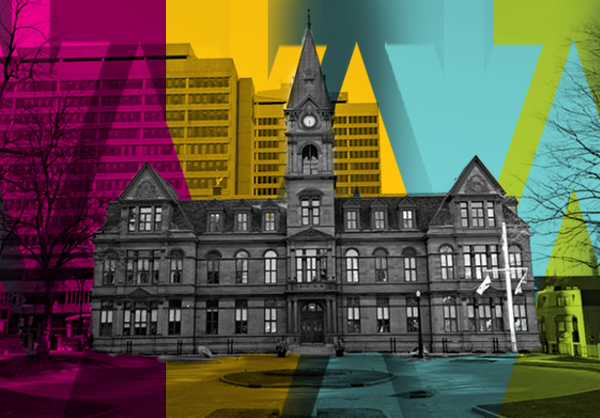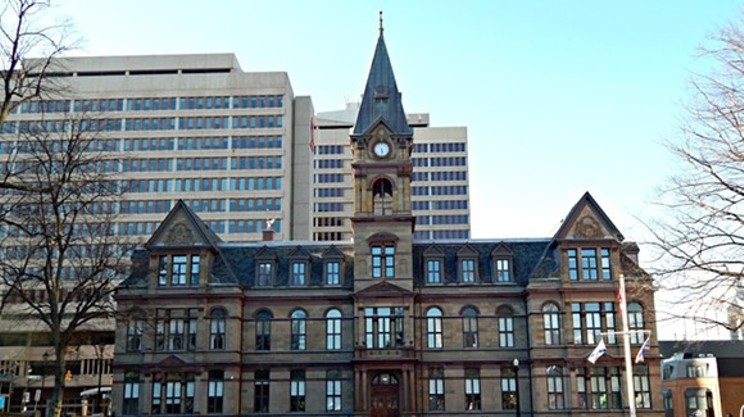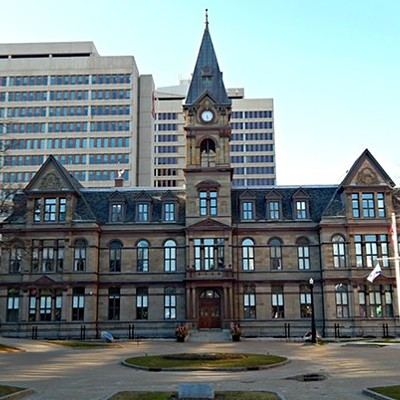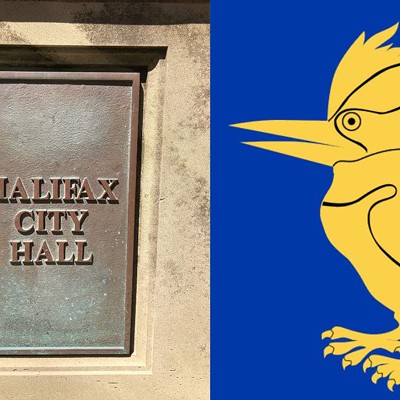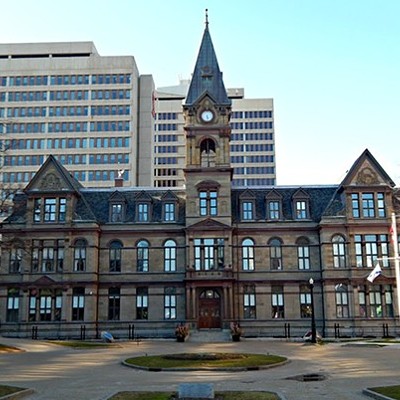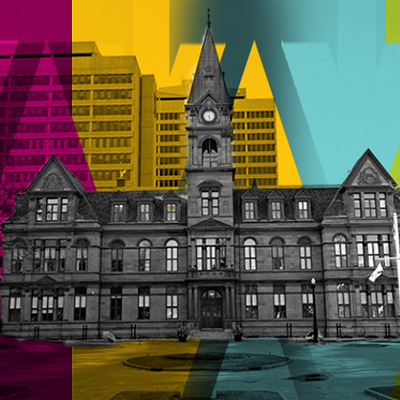Halifax council’s Wednesday budget meeting was a briefing from the city’s accountants explaining the financial difficulties in the days, weeks, months and years ahead. The main tension in the 2023 budget, as it has been for many years, is that the city is not currently sustainable.
It’s important to make a few distinctions here, because tax policy is complex and has a very real impact on people’s lives, but those impacts are often hidden behind jargon words like “externalities.” Damaging the planet is considered an externality by a lot of businesses. Damaging the planet is not something companies have to pay for in any meaningful way, regardless of what politicians claim about their policies. Take, for example, single-use plastics. Not the four or five now-banned single-use plastic items—the tonnes and tonnes of packaging shipped to every single store in every corner of the world every single day. All of that packaging costs money to dispose of. Money that people like us—not the corporations—pay in the cities where the garbage ends up. The companies do not pay for killing the planet; that damage is a “cost or benefit caused by a producer that is not financially incurred or received by that producer.” Sure, it’s killing the planet, but it’s great for the packaging companies’ bottom line. So it’s important to dive into technical terms to make sure people understand what they mean.
Sustainable, in this case, means two things. HRM is financially sustainable, or likely will be at the end of this budget process. Financially sustainable means that with heavy cuts or a tax rate increase, the city will be able to pay its bills for the next few years, at least.
However, the city is not sustainable because residents need goods and services, and the city does not bring in enough money to expand public goods and services to everyone. So while the city will continue to pay its current bills, it won’t be able to spend money on new things, even if those new things are critical pieces of infrastructure like libraries or fire stations.
It’s the latter unsustainability that’s putting the future of the city at risk. It’s an unsustainability pushed for and endorsed by the unofficial low-tax caucus. Since city politics does not have parties, and votes are not whipped, the “members” of this caucus fluctuate from meeting to meeting. In Wednesday's meeting, mayor Mike Savage staked his claim as a member of the caucus, saying he’s proud of council’s work to keep the tax rate low in previous years.
To give Savage the benefit of the doubt, the unsustainability isn’t adequately captured in the city’s financial documents. What is the cost of untendered, unplanned critical infrastructure? How does one account for that? That is a cost not measured by spreadsheets; that cost is paid in the human suffering of long-term consequences.
Say, for example, recreation programming gets cancelled and kids with no activities entertain themselves by getting in trouble with the law. If this is a sizable increase in delinquency, the cops would have to hire more cops to deal with the teenage dirtbags, baby. And if it costs more to hire cops than municipal rec program leaders (it does), can that really be counted as savings? Can that even be captured in a spreadsheet? Should it be?
Turns out it can be captured in a graph, though.
In the 1980s, the modern conservative movement really kicked off with the elections of president Ronald Reagan and prime ministers Margaret Thatcher and Brian Mulroney. Reagan is the most fun because the American meme machine has put his face on a bunch of graphs showing how Reagan’s policy choices made things objectively worse for a lot of Americans.
My new hobby is taking graphs of economic data over time and indicating the year that Ronald Reagan was inaugurated, in case people find that helpful or informative. pic.twitter.com/jdLwHv8VNK
— Ward Q. Normal (@WardQNormal) December 15, 2019
But Mulroney did a lot of damage too. The wildly oversimplified version of what happened was that Canada was in debt, interest rates were high, and so he sold off most of our national assets to balance the budget. Petro-Canada was sold, rail was sold, Air Canada was sold: It was a fire sale. A shortsighted fire sale. The Radiochemical Company (AKA “the rcc,” formerly a Canadian nuclear Crown corporation) was sold, and the Mulroney government said that it would result in less taxpayer money being spent. But that turned out to be a lie. We—taxpayers, citizens, the public at large—ended up paying more as soon as it became private: “The rcc’s sale resulted in socializing the costs and privatizing the profits of this lucrative branch of the Canadian nuclear industry.” And of course we spent more money on nuclear as soon as it went private. Of course we did. Because if something costs $1 to make, a private company needs to charge more than $1 to stay afloat; a Crown corporation does not.
And this fleecing happens every time a public good is privatized.
Every. God. Damn. Time.
Is there a reason we can’t have a train going down the Bedford Highway? Yup, it’s Jean Chrétien. Because the tracks are now a private enterprise instead of a public one (thanks Jean!) the city needs to pay for the privilege of using tracks built with public money. Had Chrétien not privatized rail, the city could just ask the feds for permission instead of paying for a private company’s profit. But hey, when you are traffic on the Bedford Highway, just know that Jean Chrétien saved a handful of bucks 30-some-odd years ago and that’s why you are traffic today.
You should be furious.
Editor's note: The abrupt transition of prime ministers is due to an earlier version of the story saying Brian Mulroney sold CN rail assets. He did not; he the sold the non-rail assets, which is pretty much everything else. CN rail assets were sold in 1995 by Jean Chrétien, at which point CN slashed jobs even though it was making money because it wasn't making enough money. And now, the company is owned in part by Bill Gates. So if you are traffic on Bedford highway, do not curse Brian Mulroney; save that for booking cheap flights with Air Canada.
Those types of long-term consequences can’t be captured in an annual budget process. It’s also why it’s unnerving to hear a mayor bragging about keeping taxes low. Because while that is a short-term message of fiscal reassurance, it is also a promise of future consequences.
Savage and others want the city to keep the low 4% tax rate increase, which will save the average household about a hundred bucks. And just a quick note on the word “average.” In English shorthand, a lot of people understand average to mean something like normal. Did you have a good time? Not good, not bad, just average.
To mathematicians, average just means “the middle number(s).” If someone asks how much a sales job pays and the answer is “the average wage is $10,” to normal humans that means “expect to make $10.” Mathematicians will ask for the data set. Because if that data says half of the people at a job work for $20 and the other half are forced to work for free, the average wage in that company would be somewhere around $10.
That’s just to say it’s not very useful to think about property taxes in the average-savings-per-household framework, and it’s kind of beside the point anyway.
What we do know is that a tax rate increase of 4% will help the landowners who need support the most, because even though it’s “only” an increase of around $100, if $100 makes a significant impact on your household budget, then $100 makes a significant impact on your household budget. Not getting that relief and paying more taxes means you will suffer.
But we also know that without raising taxes, the people who need the support of public services the most will suffer instead.
Someone always suffers if a city is unsustainable.
We will all feel this budget in some way. Unsustainability is rapidly approaching critical mass. Accountants aren’t yet worried about the fiscal sustainability side of things, but they will be if council defers making the hard decisions. These hard decisions are a bed of council's own making. Because councils have kept taxes low in previous years, taxes now need to go up. Or services need to be cut. It has to be one or the other.
Even if the mayor is ignoring or is oblivious to the larger issue of sustainability, there are councillors who understand—or who are at least are willing to publicly think and talk about the long-term implications of this year’s budget. And there is hope that they are in the majority, or at least are persuasive enough to get one.
Budget meetings continue on Friday, and the city’s chief financial officer Jerry Blackwood has told council members to be ready. Friday is when the hard decisions about the future start coming to council for consideration.
May God have mercy on our souls.

